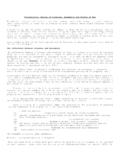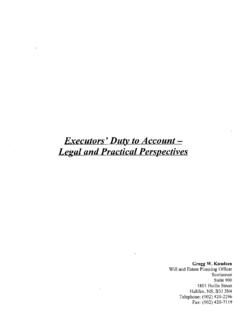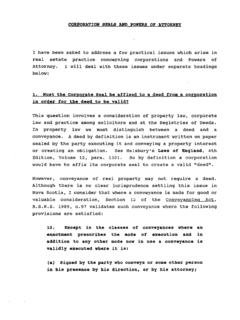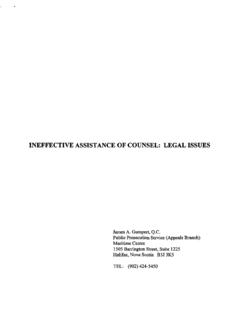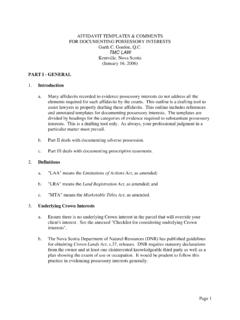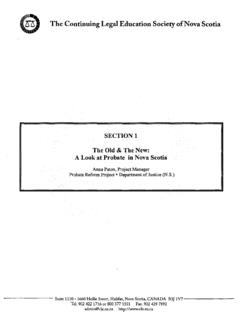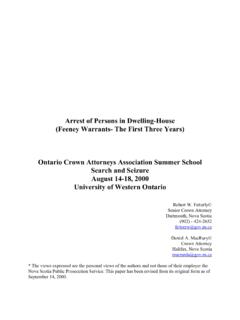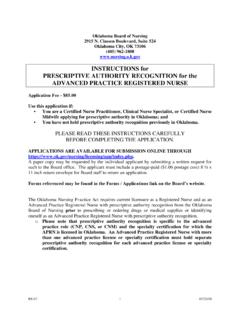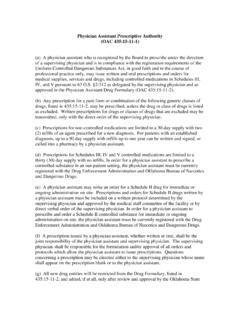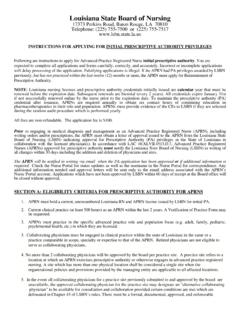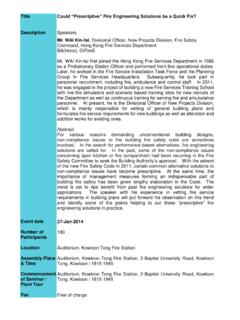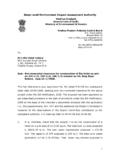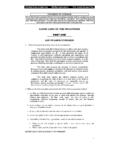Transcription of ADVERSE POSSESSION AND PRESCRIPTIVE …
1 THE NOVA SCOTIA BARRISTERS SOCIETY&THE REAL ESTATE LAWYERS ASSOCIATIONPROPERTY PRACTICE IN NEW ENVIRONMENTSFEBRUARY 21ST, 2003 ADVERSE POSSESSION AND PRESCRIPTIVE RIGHTSOLD DOCTRINES IN A NEW ENVIRONMENTC atherine S. Walker, s Law Office Jubilee Road,Halifax, Nova Scotia TABLE OF CONTENTSPART I - IntroductionWhat are we certifying?PART II - ADVERSE POSSESSION and the Role of LegislationHistorical contextAdverse POSSESSION in Nova ScotiaAdverse POSSESSION and the Common LawHow much land can be claimed?Constructive DispossessionPART III - PRESCRIPTIVE rights , the Limitation of Actions Act and the Common LawPrescriptive rights in Nova ScotiaPART IV - ADVERSE POSSESSION , PRESCRIPTIVE rights and the Land Registration ActOther land titles jurisdictionsThe Nova Scotia contextThe Land Registration ActPART V -ConclusionAPPENDICES Appendix A -Comparison of traditional Land Title system with the Land RegistrationAct systemAppendix B -Nova Scotia- Legislation relating to Possessory Interests and PrescriptiveRightsAppendix C -Possessory Title - Summary of relevant statutory provisions - CanadianLand Titles jurisdictionsAppendix D - PRESCRIPTIVE rights - Summary of relevant statutory provisions - CanadianLand Titles jurisdictionsAppendix E -Limitation of Actions- Summary of relevant statutory
2 Provisions-CanadianLand Titles jurisdictions Appendix F -Lasting Improvements-Summary of relevant statutory provisions-Canadian Land Titles jurisdictionsAppendix G -Summary of comparative statutory provisions UK legislation-Land TitlesAct, 2002 Appendix H -Form 5 of the Land Registration Administration Regulations1 Lambden, David W. - The concept of ADVERSE POSSESSION : The Land Surveying Perspective(Part One) 32 (2nd) 29 at 322 Girard, Philip ADVERSE POSSESSION and the Land Registry Act: Policy Options , January 10,2001, Land Registration Act, , 2001, , (a) ADVERSE POSSESSION AND PRESCRIPTIVE RIGHTSOLD DOCTRINES IN A NEW ENVIRONMENTPART I - INTRODUCTIONP ossessory title and PRESCRIPTIVE rights describe interests in land which may arise withoutdocumentary foundation.
3 Historically, there appears to have been some casualness with which occupiersdocumented their acts of POSSESSION . The way in which these old legal concepts, founded on the Englishlaw which recognized that all title to land is founded on POSSESSION 1 should be reflected in a new land titlessystem was a challenge for the legislators. As described by Professor Philip Girard, in his analysis carriedout for purposes of assisting the legislators in their policy considerations: Existing doctrines of ADVERSE POSSESSION and PRESCRIPTIVE easements pose obvious problems fora new land registry which is going to be based on the idea of the security and reliability of theregister. Both are valid legal interests which can arise without any document being created andindeed without the knowledge of the parties involved.
4 Under the present registry of deeds system,both are overriding interests which can be asserted against the holder of a registered deed. Atpresent, it is possible to purchase land from the registered owner A only to find that all or partof the parcel is in fact owned by B through the effect of ADVERSE POSSESSION , or that the parcelis subject to any number of PRESCRIPTIVE easements. The question is whether these doctrines shouldbe abolished, maintained, or modified in the new Land Registration Act. 2 The desire of the legislators to preserve these interests in land, while striving to achieve the newlegislation s stated purpose in part, to create a land system which was to provide certainty of ownershipof interests in land 3 resulted in the balance achieved in the new Land Registration Act.
5 While the legislators struggled with their policy considerations for ADVERSE POSSESSION and prescriptivePage 24 Preface to the Professional Standards: Real Property Transactions in Nova Scotia, asapproved by Bar Council of the Nova Scotia Barristers Society November 22, 2002rights, the Professional Standards Committee of the Nova Scotia Barristers Society embarked on aprocess to assess the manner in which the Standards relating to real property practice should be amendedin light of the pending legislative changes and the new electronic environment within which lawyers wouldbe expected to practice. That review, although changing in few respects the substantive aspects of alawyer s obligations, introduced plain language into the description of those obligations, and reinforced thelawyer s principal obligation in a real estate transaction, namely the exercise of professional judgment.
6 TheProfessional Standards Committee considered the manner in which resources could be made more easilyaccessible to the practising bar, to assist in the performance of our obligations to our clients. The newdocument while designed to arm property lawyers with more modern tools, described in its Preface,property lawyers historic role in the Nova Scotia land registry system since 1749: Over time, as land was conveyed, lawyers carefully reviewed the state of title and in so doing,became the weavers of the historical fabric preserved in the Registries of Deeds. It is this fabricthat is to be enhanced in the new system. We have been the keepers of the old system and areafforded the privilege of having a unique role in the new one to ensure that the quality and integrityof information we have so long worked to improve, is preserved for the future.
7 4 The legislators recognized the value of lawyers historical role and agreed that lawyers shouldcontinue to have a role in preserving the integrity of the information for parcels migrating into the new landregistration system. As a result, in the Land Registration Act, lawyers have been vested with the privilege,and the corresponding professional responsibility, to determine the sufficiency of title both for traditionalpaper titles and for those titles that incorporate possessory interests and PRESCRIPTIVE move towards a working understanding of the way in which we should respond to issuesinvolving possessory title and PRESCRIPTIVE rights in the new environment of the Land Registration Act, itmay be helpful to understand how these doctrines are reflected in legislation, how they have been upheldby the courts, and how other land title legislation has treated these concepts.
8 After this review the readerPage 35 Victor DiCastri, The Law of Vendor and Purchaser , (Toronto:Carswell, 1976) Youdan in The Length of a Title Search in Ontario 1986, 64 pg. 517 The Marketable Titles Act, 1995-1996, c. 9will more readily appreciate the unique role for property lawyers in Nova Scotia as embodied in the newLand Registration Act .What Title are we Certifying?A lawyer when reviewing an abstract of title is assessing the records for sufficiency of its marketability , that is, whether the title is: one which at all times and under all circumstances can be forced upon an unwillingpurchaser who is not compelled to take title which would expose him to litigation or A purchaser is not required to accept or rely upon parol evidence of title, or informationdehors the record, or upon the word of the vendor issue as to what constitutes marketable title is an issue between a vendor and purchaser, anddeals with the power of the vendor to convey, and the obligation of a purchaser to buy if the vendor candischarge the burden accorded to him with regard to the state of In 1996, The Marketable Titles Act7 as introduced included a definition of marketability.
9 Andprovided the statutory authority for the 40 year title search standard. Lawyers still had to be concernedhowever, about the exceptions noted in the statute, which included: utility rights of way (s. 7(1)(c)); easements or rights of way used and enjoyed (s. 7(1)(e)); Crown interests in land (s. 9); and interests in land that a registered owner was no longer able to recover by reasonof the Limitation of Actions Act (s. 7(2)(c)).Page 4 The standard established by the Marketable Titles Act, has been expanded by the consequentialamendments of the Land Registration Act, 2001, (s. 116(1)) as follows: s. 4(1) A person has a marketable title at common law, or equity or otherwise to aninterest in land if that person has a good and sufficient chain of title during a period greaterthan forty years immediately preceding the date the marketability is to be determined.
10 The standard that a lawyer will be required to follow when registering parcels under the new LandRegistration Act is set out in s. 37(9): s. (9) The solicitor s opinion of title shall be based on an abstract of the title certifiedshowing the chain of ownership of the parcel(a)to the standard required to demonstrate a marketable title pursuant to theMarketable Titles Act, or to the standard required pursuant to the Limitation ofActions Act or the common law; or(b)to such lesser standard as the Registrar General may approve .This provision allows for the registration of titles that may not be based solely on a forty year paperchain, and includes those interests established by ADVERSE POSSESSION and prescription.
